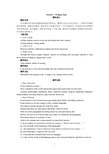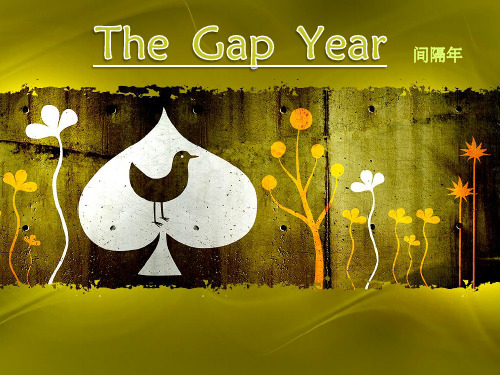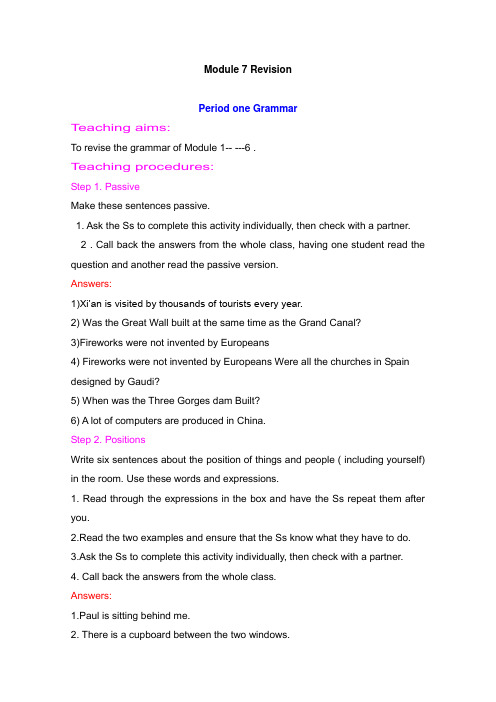(外研版必修3)Module 7 RevisionReading and speaking课件
- 格式:ppt
- 大小:386.00 KB
- 文档页数:6

外研社版新标准高中英语目录:第1册(必修1)目录:MODULE 1 My First Day at Senior HighMODULE 2 My New TeachersMODULE 3 My First Ride on a TrainMODULE 4 A Social Survey-My Neighbourhood MODULE 5 A Lesson in a LabMODULE 6 The Internet and Telecommunications第2册(必修2)目录:MODULE 1 Our Body and Healthy HabitsMODULE 2 No DrugsMODULE 3 MusicMODULE 4 Fine Arts-Western, Chinese and Pop Arts MODULE 5 Newspapers and MagazinesMODULE 6 Films and TV ProgrammesMODULE 7 Revision第3册(必修3)目录:MODULE 1 EuropeMODULE 2 Developing and Developed Countries MODULE 3 The Violence of NatureMODULE 4 Sandstorms in AsiaMODULE 5 Great People and Great Inventions of Ancient China MODULE 6 Old and NewMODULE 7 Revision第4册(必修4)目录:MODULE 1 Life in the FutureMODULE 2 Traffic JamMODULE 3 Body Language and Non-Verbal Communication MODULE 4 Great ScientistsMODULE 5 A Trip Along the Three GorgesMODULE 6 Unexplained Mysteries of the Natural World第5册(必修5)目录:MODULE 1 British and American EnglishMODULE 2 A Job Worth DoingMODULE 3 Adventure in Literature and the CinemaMODULE 4 CarnivalMODULE 5 The Great Sports PersonalityMODULE 6 Animals in DangerMODULE 7 Revision第6册(选修6)目录:MODULE 1 Small TalkMODULE 2 Fantasy LiteratureMODULE 3 Interpersonal Relationships-- Friendship MODULE 4 MusicMODULE 5 CloningMODULE 6 War and PeaceMODULE 7 Revision第7册(选修7)目录:MODULE 1 BasketballMODULE 2 Highlights of My Senior YearMODULE 3 LiteratureMODULE 4 Music Born in AmericaMODULE 5 Ethnic CultureMODULE 6 The World's Cultural HeritageMODULE 7 Revision第8册(选修8)目录:MODULE 1 Deep SouthMODULE 2 The RenaissanceMODULE 3 Foreign FoodMODULE 4 Which English?MODULE 5 The Conquest of the UniverseMODULE 6 The Tang PoemsMODULE 7 Revision第9册(选修9)目录:MODULE 1 Bernard Shaw's PygmalionMODULE 2 DAN—the Secret of LifeMODULE 3 The Qin Tomb and the Terracotta Warriors MODULE 4 Languages of the WorldMODULE 5 The First AmericansMODULE 6 Why Do We Need Dictionaries?MODULE 7 Revision第10册(选修10)目录:MODULE 1 Pride and PrejudiceMODULE 2 Australia and New ZealandMODULE 3 Slavery and the American Civil War MODULE 4 The Magic of FilmMODULE 5 High-tech LivingMODULE 6 The Maple Leaf CountryMODULE 7 Revision第11册(选修11)目录:MODULE 1 The Boston Tea PartyMODULE 2 The Long Walk to FreedomMODULE 3 Ernest HemingwayMODULE 4 Sherlock HolmesMODULE 5 The Last Laugh MODULE 6 The United Nations MODULE 7 Revision。

Period 3Writing; Task整体设计教材分析本节课的写作部分是描述某次旅行的经历, 教师可以先让学生分析上一节课中学到的课文的结构, 掌握写作要求,然后学生可以展开来写一下自己的经历。
任务部分学生需要复习所学的内容, 综合描述。
同时本节也是一个复习课, 要求学生从整体上把握本书的内容, 并在课后反复复习。
三维目标1. 知识与技能1)Make students learn to revise the knowledge they have learned.2)Train students’ writing ability.2. 过程与方法Motivate students’ enthusiasm in taking part in the discussion.3. 情感与价值Through this period inspire students’interest in travelling and encourage students to read books about travelling to enlarge their vision.教学重点Train students’ ability of writing.教学难点Lead students to revise the knowledge they have learned in this book.教学方法Individual work and pair work to make every student work in class.教学过程→ Step 1 Revisio n(Greet students as usual. )Have a dictation of the words and useful expressions learnt in the text last class:coastline, philosopher, population, affect, chemical, climate, frequent, frightened, industrial, island, polluted, freezing, attractive, gap, astonish, all the way→ Step 2 WritingIn last period we have learned a passage telling about Mark’s travelling experience.In this period we are also going to write a similar paragraph.Now please read the passage My Gap Year again.Imagine that there are other places that Mark visited in China.Write two more paragraphs describing where he went and what he did.Before you write it we’d better make sure where we should put our paragraphs.Now please discuss it in groups of four.(After a few minutes ask a representative to report their answer)A: In my opi nion we should put it before the sentence “ When I was in China. . . ”.Q: Can you think of the beginning of the paragraph?A: My beginning is “then I visited two more places of interest in the country. . . ”.Q: And which place of interest will you visit?A: I will climb the Oriental Pearl Tower in Shanghai.A: I will visit the Tomb of Qinshihuang and see the Terracotta Warriors and Horses in Xi’an.A: I will write about my experience of climbing Mount Tai in Shandong Province.A: . . .Now students may read and correct each other’s work.(A few minutes later ask the good ones to read their works to the whole class. )→ Step 3 TaskThe Task in this module is to write a brief description of China for an encyclopedia.First please work in groups of four. Find information to help you write the following.Use information you have learnt in this book. Give a heading to each section.(Show the following on the screen. )1. Write a short geographical description of China. Give the locations of the most imp ortant mountain ranges, d eserts and rivers.2. Write brief descriptions of three or four of China’s major cities.3. Briefly describe the teachings of two or three of China’s greatest philosophers.4. Name China’s greatest inventions and tell when they were invented.5. Briefly describe how China has changed in the last 20 years.(You may ask students to report their results after a discussion. )→ Step 4 ConsolidationIn this module we revised what we had learned in this whole book. Now let’s do some exercises to consolidate them.(Show the following on the screen. )1. A friend of mine returned to his house after a holiday only to find it_____________ .A. to be brokenB. had broken intoC. was brokenD. had been broken into2. New York,_____________ last year, is a nice old city.A. that I visitedB. which I visitedC. where I visitedD. in which I visited3. Do let your father know all the truth. He appears_____________ everything.A. to tellB. to be toldC. to be tellingD. to have been told4. The result of the experiment was very good,_____________ we hadn’t expected.A. whenB. thatC. whichD. what5. —What were you up to when she dropped in?—I_____________ for a while and_____________ some reading.A. was playing; was going to doB. played; didC. had played; was going to doD. had played; did6. Shortly after we_____________ , a writer came over to our table with a smile.A. seatedB. were seatedC. sat themselvesD. took places7. The teacher as well as a number of students_____________ to attend the party yesterday.A. were askedB. was askedC. were askingD. was asking8. I could do anything but_____________ .A. to waitB. waitC. to stayD. stayed9. This was the first time the students_____________ to Hyde Park.A. have goneB. have been goneC. had goneD. are being gone10. By the end of last year they_____________ 1000 machines.A. turned outB. had turned outC. would turn outD. had been turned outSuggested answers:1. D2. B3. D4. C5. C6. B7. B8. B9. C10. B→ Step 5 Summary and HomeworkToday we have pracitced writing skills. Besides, we have revised what we learned in the whole book.Homework:Find more information about travelling in China.板书设计Module 7RevisionPeriod 3Writing; TaskWrite a brief description of China for an encyclopedia.1. Write a short geographical description of China. Give the locations of the most important mountain ranges, deserts and rivers.2. Write brief descriptions of three or four of China’s major cities.3. Briefly describe the teachings of two or three of China’s greatest philosophers.4. Name China’s greatest inventions and say when they were invented.5. Briefly describe how China has changed in the last 20 years.活动与探究1. Learn more about the culture of China.2. Practice writing skills.。



Module 7 RevisionPeriod one GrammarT eaching aims:To revise the grammar of Module 1-- ---6 .T eaching procedures:Step 1. PassiveMake these sentences passive.1. Ask the Ss to complete this activity individually, then check with a partner.2 . Call back the answers from the whole class, having one student read the question and another read the passive version.Answers:1)Xi’an is visited by thousands of tourists every year.2) Was the Great Wall built at the same time as the Grand Canal?3)Fireworks were not invented by Europeans4) Fireworks were not invented by Europeans Were all the churches in Spain designed by Gaudi?5) When was the Three Gorges dam Built?6) A lot of computers are produced in China.Step 2. PositionsWrite six sentences about the position of things and people ( including yourself) in the room. Use these words and expressions.1. Read through the expressions in the box and have the Ss repeat them after you.2.Read the two examples and ensure that the Ss know what they have to do.3.Ask the Ss to complete this activity individually, then check with a partner.4. Call back the answers from the whole class.Answers:1.Paul is sitting behind me.2. There is a cupboard between the two windows.3. Mike is sitting in front of Jane.4. There is a vase of flowers in the middle of table.5. My pen is next to my pencil.6. There’s a book case on the right of the door.7. There’s a blackboard on the left of the window.8. There’s a map on the wall opposite the blackboard.Step 3. Linking wordsChoose the correct linking words.1. Ask the Ss to complete this activity individually, then check with a partner.2. Call back the answers from the whole class, having each student read a complete sentence.Answers:1) although2) but 3)whereas4) But 5) However6) whileToday we will learnStep 4. Past past tense.Decide if the verbs in italics are in the right tense. Correct the wrong .1. Ask the Ss to complete this activity individually, then check with a partner.2. Call back the answers from the whole class, as corrected sentences where necessary.Answers:1) had killed 2)had used 3)had been blown4) correct 5)had never seen 6)had beenStep 5. Verb formsChoose the correct verb form to complete each sentence.1. Ask the Ss to complete this activity individually, then check with a partner.2. Call back the answers from the whole class, as complete sentences Answers: 1)a 2)b 3) b 4) b) 5) b 6)bStep 6. Attributive ClauseConnect each pair of sentences using an attributive clause. Use commas where necessary.1. Read the example out and have the Ss follow in their books.2. Ask the Ss to complete this activity individually, then check with a partner.3. Call back the answers from the whole class, having one student read the two sentences and another the combined sentence.Answers:1)My uncle, who is thirty-three, is getting married.2)They visited an area of the desert where it only rains once a year.3)Mother Theresa, who helped poor people all over the world,died when she was 85.4)The ice which covers the south Pole has begun to melt.5)Confucianism which is still important today is an ancient Chinese philosophy.6)The ancient Egyptians, who were hardworking people, built the pyramids. Step 8. Homework.Period two VocabularyTeaching aims:To revise the important words and phrase of Module 1-6Teaching procedures:Step 1. Noun and Adjective formsWrite sentences using a noun from Box A and an adjective from Box B. Example: The coastline was very polluted.(1) Read through the words in the boxes and have the Ss repeat them after you.2. Ask the Ss to complete this activity individually, then check with a partner.3. Call back the answers from the whole class.Answers:1) The architecture is very modern.2) The coastline is very polluted.3) The earthquake was very frightening.4) The fishing village is very attractive.5) The philosopher was very wise.6) The population is huge.7) The ruler is very strong.8) The weather is freezing.Step 2. Correct formComplete the passage below using the correct form of the word given.1. Read through the words in the boxes and have the Ss repeat them after you.2. Ask the Ss to complete this activity individually, then check with a partner.3. Call back the answers from the whole class, with different Ss reading complete sentences.Answers:1)frightened 2) island 3) affected 4)quiet 5)crops6) industrial 7)wind 8)chemicals9) climate 10)frequentStep 3. Positive and negative wordsDivide the words below into two groups: words you see as positive and t1.1.Read through the words in the boxes and have the Ss repeat them after you.2. Ask the Ss to complete this activity individually.3. Call back the answers from the whole class.Answers:Positive: honesty , justice , peacefulNegative: crowded , dirty , flood, hunger , pollutionNow work in pairs . Explain to your partner why you put the words in these groups.Step 4. HomeworkPeriod three Reading and SpeakingTeaching aims:1 To learn some interests of different places in the world.2 To develop the students’ reading skills.Teaching procedures:Step 1. RevisionStep 2. Lead-inDo you like traveling ? Where have you visited?Step 3. Fast-reading:Read the passage , an article written by a student called Mark .And Number the countries in the order that he visited them.1. Ask the Ss to complete this activity individually, then check with a partner.2 . Call back the answers from the whole class.Answers:1) France 2)Italy 3)Greece 4)India 5)China 6)Japan Step 4. Further readingRead again and fill in the forms with the key words.1. Ask the Ss to complete this activity individually, then check with a partner.2 . Call back the answers from the whole class, having one student read the question and another answer.Answers:1. He spent a month walking in the mountains2.Rome3.Greece4.In a fishing village in India5.India6. 1)beaches in France 2)art galleries in Rome 3)countryside in India4)weeks in Japan 5)Philosopher ConfuciusStep 5. Interview1. Group of four. Suppose one of you is Mark, the other three are news reporters. The reporters ask some questions about your journey.Begin like this:R: Hello! Mark. I have heard you come back from your one year journey.--------How many countries did you visit during your gap year?--------What are the countries?--------During your journey, where did you enjoyed yourself most?.....2. Choose the best one comes to the front and all the reporters interview him. Step 6. DiscussionWork in groups.1. Group the Ss in three. Read out the instructions while they follow in theirbooks.2. Tell them to take making notes first.3. Circulate and monitor their production.Step 8. HomeworkPeriod four Writing and TaskTeaching aims:1 To understand some interests of China.2 To write a brief of description of China for an encyclopaedia.Difficult and important points:1 Get the students to collect the information about China’s Geographical, greatest philosophers, their teachings, great inventions , great changes. Teaching procedures:Step 1. Revision:Read the passage My GapYear again.Step 2. WritingImagine that there are other places that Mark visited in China.Write two more paragraphs describing where he went and what he did.1. Read through the instructions and make sure the students understand whatto do.2. If you wish, elicit suggestions for other places a foreign tourist might want tovisit and note them—and their attractions – on the Bb.3.Ask the Ss to write individually. (such as: Shanghai: walk along Nanjing Road, taking pictures of Jin Mao Building; climb the Oriental P earl Tower; Xi’an: visit the Tomb of Qin Shihuang, the Terracotta Warriors and Horses; Shandong: climb Mount tai, pay a visit to the temple of Confucius….)For example:Then I visited two more places of interest in the country……4. They should then exchange their writing for peer correction of language and Step 3. TaskWriting a brief description of China for an encyclopaedia.1. Work in groups. Find information to help you write the following. Use the information you have learned in this book. Give headings to teach section.1). Go through the steps while the Ss follow in their books.2) Group the Ss. You may wish to suggest that each member of the group takes responsibility for one section.Group A: Geographical description.Group B: Descriptions of greatest philosophers.Group C: Descriptions of their teachingsGroup D: Descriptions of great inventionsGroup E : Great changes3) You will need to give them time to research their topics, so it is probably better given as homework.4) Back in class, the groups will need to co-ordinate and organize theirwork, deciding who is doing what when in their presentation.5) They should also rehearse the presentation .They can then do it for another group and get criticism on how it was.2. Give a presentation on China using your written work.Ask the groups to do their presentation to the whole class.3. Vote to find the group which gave the best presentation.Step 4. HomeworkHand in your presentation.。

Book 3 Module 7Revision –reading and speaking【学习目标】 1. master some skills for cloze tests.2. apply the skills to practical use.3. display your teamwork ability.¤¤¤¤¤¤¤¤¤¤¤¤¤¤¤¤¤¤¤¤¤¤¤¤¤¤课前交流分析目标¤¤¤¤¤¤¤¤¤¤¤¤¤¤¤¤¤¤¤¤¤¤¤¤¤¤¤课标解读_____________________________________________________________命题规律_____________________________________________________________考点分布_____________________________________________________________What is your problem when coping with cloze tests?____________________________How can we solve the problems?____________________________________________学长的建议:____________________________________________________________¤¤¤¤¤¤¤¤¤¤¤¤¤¤¤¤¤¤¤¤¤¤¤¤¤课堂探讨小组合作¤¤¤¤¤¤¤¤¤¤¤¤¤¤¤¤¤¤¤¤¤¤¤¤¤¤¤¤Part I 技巧分析1.先完意,后完形。